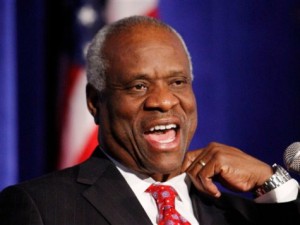I actually thought it had been longer than a mere decade since Supreme Court Justice Clarence Thomas had asked a question during oral arguments before the nation’s highest court.
Nope. It’s only been 10 years.
The New York Times article attached here spells out what Justice Thomas has settled on as his reason for remaining silent.
It’s discourteous, he told the Times.
Discourteous? You mean if a lawyer says something that you believe needs clarification, but none of your court colleagues wants to seek some clarity, that you don’t want to be rude by asking the lawyer a question?
I don’t quite get that.
On second thought, it makes no sense at all.
Justice Thomas was President George H.W. Bush’s pick in 1991 to serve on the court. He succeeded perhaps one of the most argumentative men ever to serve there, the late Justice Thurgood Marshall, who earned his Supreme Court spurs by arguing successfully before the court on the historic Brown v. Board of Education decision that ended desegregation in public schools.
President Lyndon Johnson made history by appointing Marshall to the court in 1967, making him the first African-American to serve there.
Justice Thomas is a decidedly different type of high court jurist, both in judicial philosophy and temperament, apparently, than the man he succeeded.
I believe President Bush offered a serious overestimation of Clarence Thomas when he called him the “most qualified man” to sit on the high court.
That said, Thomas has been true to his conservative principles over the past quarter century.
As for the next time he asks a question of a lawyer, you can be sure the media will make a big deal of it.
